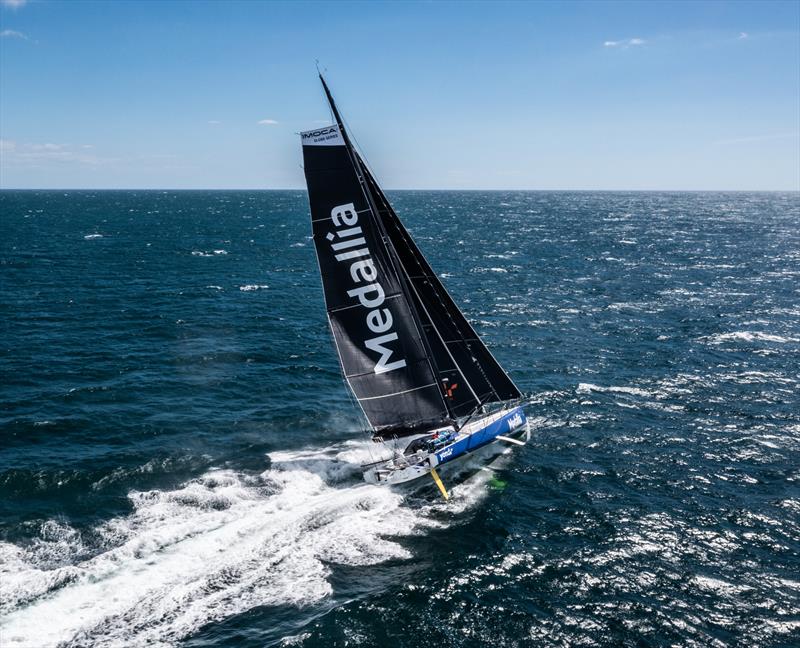
Could You Complete the Vendée Globe?
by Cyclops Marine 1 Nov 2024 01:00 NZDT

Pip Hare Ocean Racing © Ocean Images
The world's best skippers are making their final preparations for the "Everest of the seas" — the 24,300 mile non-stop round-the-world solo epic that is the Vendée Globe.
"It's a combination of factors that makes this race as extreme as it is—two-and-a-half months alone at sea, wind speeds in excess of 70 mph, and waves as high as ten-storey buildings. All of this needs to be tackled on minimal sleep, and a diet of freeze-dried food."
Alex Thompson, former Vendée Globe skipper (squaremile.com)
Even with all this to contend with, somewhere in the back of every sailor's mind is the burning question - could I do it?
What does it take?
Sailing Expertise: Handling an IMOCA 60 in the most treacherous seas, navigating complex weather systems, trimming sails for maximum efficiency, and solving countless problems on the fly—all single handed and a long way from assistance.
Physical Endurance: Typically sleeping for 20-40 minutes every few hours, sleep deprivation is a constant for the skippers, while the physical demands of solo sailing in extreme sea states and potentially freezing temperatures cannot be understated.
Mental Toughness: How would you react if your equipment failed hundreds of miles from land? You never know for sure until you're faced with it, but the best ocean sailors adapt—maintaining composure, focus, and a clear strategy, even when things go wrong.
Equipment and Innovation: The new generation of IMOCA 60 is capable of foiling high out of the water at 30+ knots and the skippers are equipped with a range of advanced control systems and monitoring technologies. The most successful skippers will be those who have integrated the best technologies seamlessly into their campaigns, refining their tools until they become a natural extension of themselves.
Tip: Don't Do It Alone
The Vendée Globe is famously a solo race, but there's one crew mate that the majority of the top skippers will have talking to them right the way through—load sensors from Cyclops.
For example, one leading contender, Charlie Dalin (Macif Santé Prévoyance), is equipped with six Cyclops load pins monitoring his standing rigging, with live data displayed via his onboard instruments. smartlink² wireless load sensors are also popular throughout the fleet for monitoring soft lines. For instance, onboard Groupe Apicil, smartlinks monitor the outriggers, the J3, and various other running lines.
Fast, repeatable settings
Logging data in training, tuning, and throughout the IMOCA Globe Series, the skippers will have a bank of optimal load numbers they need to hit to excel in different conditions. With the power of the new generation of IMOCA 60, reaching optimal settings quickly and efficiently could mean opening up a huge gap on your competition.
An eye in the dark
The nights are some of the most challenging times for the skippers. Without full visibility of the sails and rig, Cyclops load sensors can serve as their eyes in the dark. With load data wirelessly relayed to displays in the cockpit, the skippers can stay sheltered, get some sleep, and be confident they are optimising their boat speed and hitting their targets.
Pip Hare, skipper, Medallia:
"When I'm sailing alone across oceans, I need to rely on all the kit on the boat and be confident in my suppliers. So I'm delighted to be using Cyclops Marine's wireless load sensing technology."
When fatigue takes hold
When extreme tiredness sets in after months at sea, and the pressure to make the right decisions and maintain boat speed continues to mount, having a known setting to return to is invaluable.
Avoiding the worst
How many Vendée Globe campaigns have ended with catastrophic damage? There are countless stories of innovative improvised repairs, but taking preemptive action is always preferable. Having live loads on screen allows the skippers to push hard, with one eye on upper limits.
Cyclops sensors have circumnavigated the globe many times, not only on IMOCAs and Ultims during ocean races, but also bringing many of the same benefits to all levels of racing, and to cruising sailors seeking enhanced safety, efficient sailing and confident cruising:
Find the sensor for your boat or contact an expert to learn more.